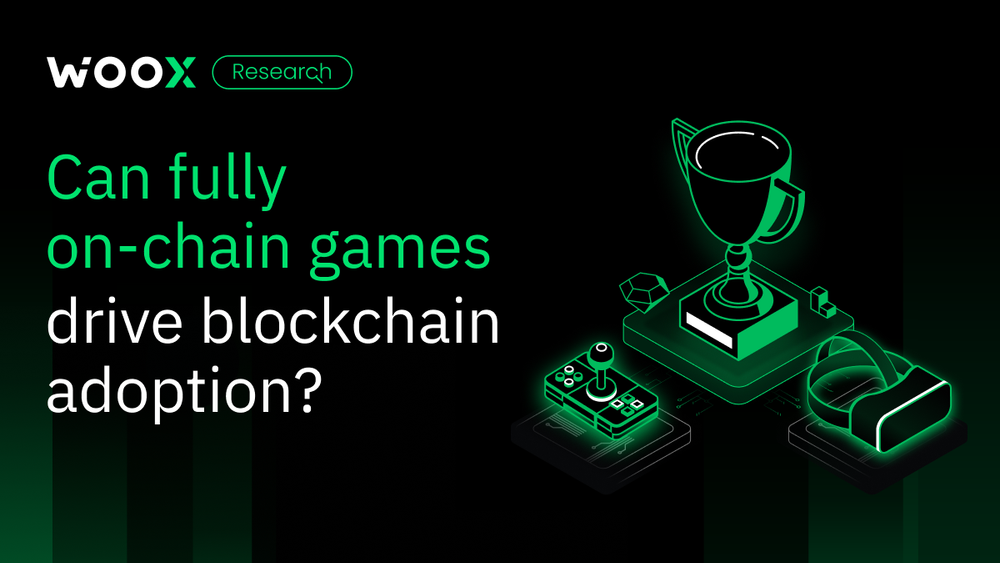Can fully on-chain games drive blockchain adoption?
Games, including traditional sports and esports, entertain and educate, pushing players to exceed their limits and bringing spectators together in shared triumphs. Dutch historian Johan Huizinga argued that games precede culture and that human civilization is built upon games.
This perspective resonates in the digital age, where many advocate that a well-crafted Web3 game could significantly boost the adoption of blockchain technology.
Popular Web3 games like Axie Infinity and StepN have already demonstrated this potential. These games, especially during their peak, became more than just entertainment; they provided livelihoods, particularly in Southeast Asia, through their play-to-earn model.
Nevertheless, games such as Axie Infinity are only partially on-chain, where in-game assets and tokens are recorded on blockchains, but the core gameplay still relies on centralized servers controlled by the developers, making them more akin to Web2.5.
The ideal Web3 games should be fully on-chain, with all basic logic and structures recorded transparently on the blockchain, aligning with the decentralized ethos of blockchain technology.
Ref: Bankless
Characteristics of Fully on-chain (FOC) games
The concept of Fully On-Chain (FOC) games has been exemplified by Dark Forest, a decentralized strategy game engineered on the Ethereum blockchain using zkSNARKs technology.
The developer of this game Gubsheep upholds the belief that "gaming is a leading indicator of emerging technologies", and "crypto unlocks fundamentally new ways of doing things that were not possible before."
Combining these two, a crypto-native FOC game should fully embrace the architectural paradigms and principles of blockchain application development:
1. Blockchain as the source of truth: All game data is stored on the blockchain, ensuring transparency and immutability.
2. Smart contract game logic: The core game mechanics and rules are codified into smart contracts, automating enforcement without centralized oversight.
3. Open ecosystem compliance: The game adheres to the principles of open ecosystems, fostering a community-driven development environment.
4. Client-Agnostic interface: The game can be accessed through any client that connects to the blockchain, without any central reliance on the core-developer-provided client.
5. Integration of Real-World Value Digital Assets: The game incorporates digital assets that hold real-world value, enhancing player engagement through tangible stakes.
Benefits of FOC games
1. Permissionless innovation: FOC games facilitate an environment where developers and players can innovate without needing permission from centralized authorities. This openness fosters a vibrant and competitive marketplace, enhancing the game’s economic model and allowing for community-driven enhancements and modifications.
2. Fairness and transparency: By leveraging blockchain technology, FOC games ensure that all transactions and game dynamics are transparent and auditable by anyone. This transparency minimizes the potential for unfair manipulation, providing a gaming environment where fairness is inherent.
3. Interoperability: Building on blockchains, assets and data within FOC games have the potential to be transferred across different gaming platforms or environments. This could provide an unprecedented experience for gamers who engage with a wide range of games
Challenges facing FOC games
1. High entry barrier: FOC games often require a certain level of technical knowledge and familiarity with blockchain technology, which can deter mainstream gamers who are accustomed to more traditional gaming environments.
2. Compromised game experience: Due to the experimental nature of blockchain integration, FOC games can suffer from frequent bugs and glitches that disrupt gameplay, leading to a less satisfactory user experience.
3. Latency issues: The decentralized nature of blockchains can introduce latency, as each action within the game may require confirmation across multiple nodes, which can slow down gameplay significantly compared to centralized servers.
4. Botting: The open and permissionless structure of blockchain games can make them susceptible to botting, where automated scripts perform game tasks to gain unfair advantages, potentially undermining the gaming experience for real players.
5. High costs: Blockchain transactions often incur gas fees, which can add up quickly in games requiring frequent transactions. This can make playing FOC games more expensive than traditional games, limiting their accessibility and popularity.
Closing thoughts
According to Footprint data, there are currently over 3,300 Web3 gaming protocols, representing nearly a sixfold increase since 2021. However, the number of actively engaged games has not kept pace, with less than a doubling since January 2022, indicating that only about one-third of the new games demonstrate the quality necessary to retain users.
Moreover, the $1 billion total market capitalization of gaming tokens remains below the peak market share of 8.78% reached in December 2021.
With the market interest in memecoins and ETFs in this bull cycle, the Web3 gaming industry has yet to produce a definitive killer game.
As the Web3 space seeks greater mainstream adoption, it hinges on effective communication—a process American psychologist William Stephenson equates to
"Gaming."Enthusiasts in the field are still working tirelessly to innovate and bring forth the next big thing.
Disclaimer
The information provided in this article is for general informational purposes only and does not constitute financial, investment, legal, or professional advice of any kind. While we have made every effort to ensure that the information contained herein is accurate and up-to-date, we make no guarantees as to its completeness or accuracy. The content is based on information available at the time of writing and may be subject to change. We make no representations or warranties, express or implied, about the completeness, accuracy, reliability, suitability, or availability with respect to the information, products, services, or related graphics contained in this article for any purpose.
Please note that this article includes references to third-party websites and data, which are provided solely for convenience and informational purposes. We do not endorse or assume any responsibility for the content, accuracy, or reliability of any information, products, or services offered by third parties.
This article mentions various games and technologies that involve investment in digital currencies and blockchain technology. Such investments are speculative and involve substantial risks. Cryptocurrencies involve significant risk and are NOT suitable for the majority of investors. The value of digital currencies can be extremely volatile, and you should carefully consider your investment objectives, level of experience, and risk appetite before participating in any investment activities.We strongly recommend that you seek independent advice from a qualified professional before making any investment or financial decisions related to cryptocurrencies.
Names of actual companies and products mentioned herein may be the trademarks of their respective owners. Unless specified, this article does not endorse any brand, company, or individual nor does it suggest any affiliation or endorsement.
Statements made regarding potential future developments, adoption rates, and technological advancements are forward-looking and speculative. Actual results could differ materially due to various factors, including technological changes, market dynamics, and regulatory developments.
Any interactive features (e.g., games, tools, links) provided in this article are purely for educational and entertainment purposes. We make no representations regarding the outcomes of these features and are not liable for any issues that arise from their use. We shall in NO case be liable for any loss or damage arising directly or indirectly from the use of or reliance on the information contained in this article.


